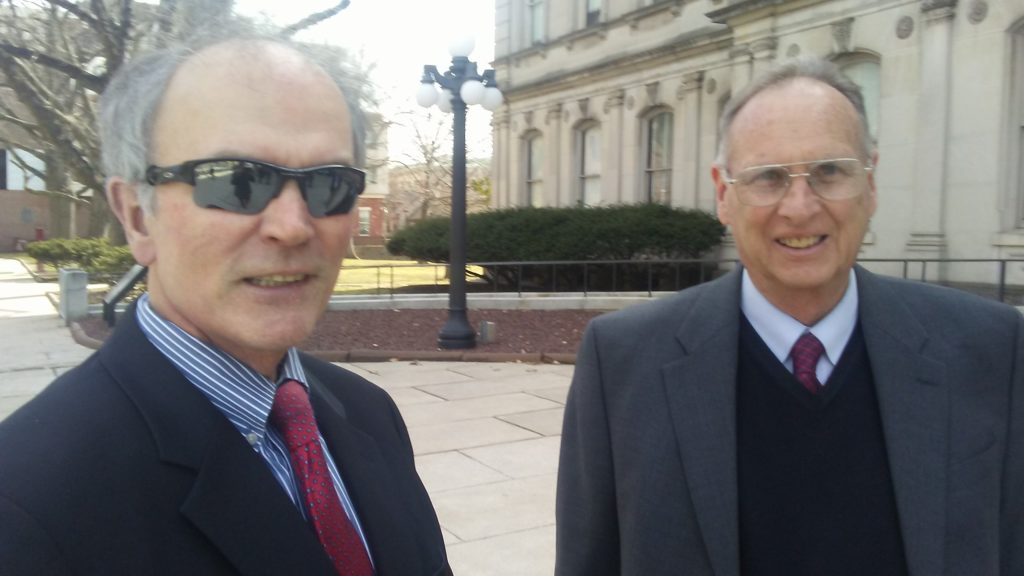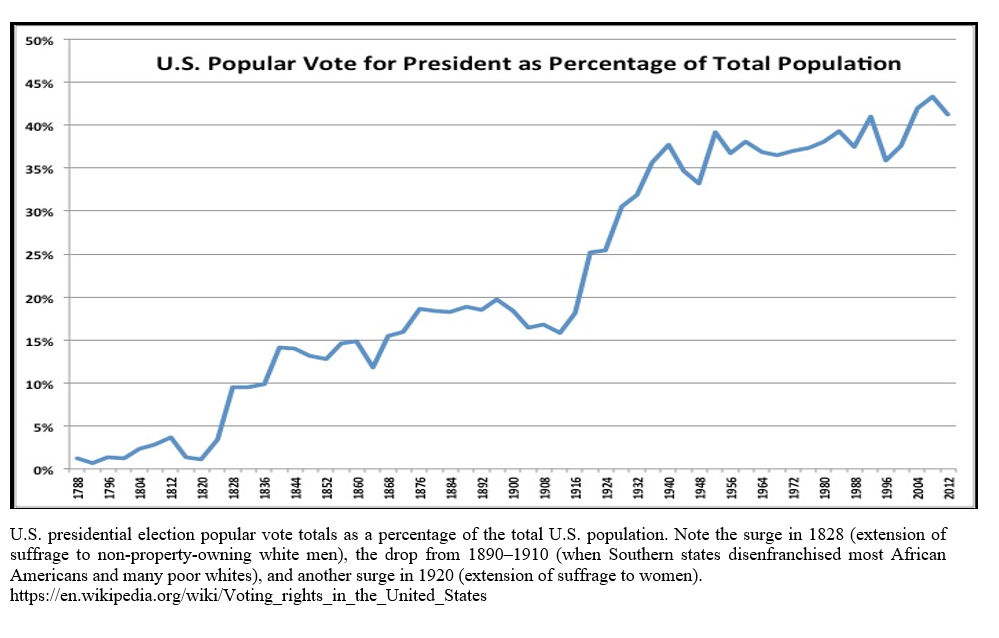HISTORY SHOWS POLITICAL PARTIES HAVE ADVANCED VOTING RIGHTS

Political parties perform many functions. One rarely noted has been their historic role in expanding democracy and extending the voter franchise.
Voting rights almost always has been contentious. Intense debates today over issues like voting ID and gerrymandering indicate that progress does not come easily on such fundamental issues. Some even fret that democracy itself is at risk due to the growing polarization of the two major parties.
History shows, however, that the tug-of-war between the two parties has led to more democracy, not less.
In 1788, only about one percent of Americans cast votes for president, according to US Census data. By 2012, the number had reached more than 40 percent, in part due to the efforts of parties.

During the centuries-long struggle, sometimes Democrats have taken the lead. Other times, it was the Republicans. Some changes were bipartisan. Other reforms were instigated by third parties like the Progressives.
What is clear is when the nation began, voting was an exclusive right.
At the founding, the original Constitution did not specify voter eligibility, instead letting each state decide. In the years following the ratification of the Constitution in 1789, the voter franchise was limited to freeholders, generally white male property owners.
This tradition was carried forward from colonial days under England, and more distantly from ancient Athens, wherein Aristotle wrote of adult male citizens, presumably property owners, participating in direct democracy.
The initial effort to advance voting rights began with the Jeffersonian party in the early 1800s. Pressed by the young party, some states eventually repealed property, income and tax-paying qualifications, and allowed renters to vote.
At the time, the party system was not yet a mass party system but rather one of cadre parties, or factions within Congress. Nevertheless, this was a step toward expanding the electorate.
The trend toward democratization was furthered in the 1830’s by the emergence of the mass party system, brought about by the establishment of the Democratic party and later the Whig party.
Democrats under President Andrew Jackson extended the rights of the common man. They fully eliminated property ownership as a qualification for voting and replaced it with a taxpayer qualification.
After the Civil War, with the support of the newly established Republican party, the 15th Amendment was ratified. Though some New England states allowed African-Americans to vote before the Civil War, the Amendment solidified that right for black males.
It read in part “no state shall make or enforce any law which shall abridge the privileges or immunities of citizens of the United States.”
Though states, particularly southern states, would enact laws designed to impede voting by African-Americans, eventually the Amendment, backed by U.S. Supreme Court rulings and congressional action, paved the way for an expansion of voting rights for all.
The Progressive party in the late 1800’s championed women’s rights, including their right to vote. When the Republican party took control of both houses of Congress in 1919, with Democrat Woodrow Wilson in the White House, the 19th Amendment, giving women the right to vote, was passed by the House and Senate and ratified by the states in 1920.
In 1965, a Democratic majority in Congress, along with Republican support, passed the Voting Rights Act. The Act enforced the 15th Amendment and made illegal “voting qualifications or prerequisite to voting” that denies the right to vote on account of race or color.
The Voting Rights Act banned literacy tests, proofs of good moral character, and voucher for qualifications of registered voters.
Today the political parties are locked in a debate again involving voting rights, including the question of whether individuals should be required to present an ID before voting.
The Democratic party opposes voter ID laws, arguing that they present an unnecessary impediment, particularly among minority voters and the poor.
The Republican party favors voter ID laws to protect the integrity of the vote by insuring that ballots are not fraudulently cast.
However the issue plays out, it shows that the parties continue, two centuries later, to be concerned with voting rights, even if for partisan and self-interested reasons.
Efforts by political parties to expand democracy and advance voting rights is one of many contributions made by parties, including those in New Jersey.
Just three months ago, Governor Phil Murphy in April enacted a bill described by Politico as “one of the most expansive voter registration laws in the country.” Under the bill (A-2014), New Jersey citizens seeking or renewing a driver’s license at a Motor Vehicle Commission office would automatically be registered to vote unless they opt out.
Democrats are pressing for other laws to expand voter rolls and participation, including bills that would expand early voting and let people register to vote online.
Party advocacy of voter rights is among the many reasons why the political party system needs strengthening
Parties are in decline partly because special interest groups that used to financially support them directly are spending a fast-growing share of their funds on independent campaigns.
During last year’s gubernatorial and legislative election, independent special interest groups spent $48 million and outdistanced the political parties by a significant amount.
Tight limits on contributions by public contractors since the mid-2000s also are pinching the coffers of New Jersey political parties.
In the wake of these growing onslaughts, the parties will soon become irrelevant without legislation reversing this trend.
The New Jersey Election Law Enforcement Commission has made recommendations that would strengthen political parties and restore their rightful place in the electoral system in New Jersey
They include: exempting parties from pay-to-play; increasing contribution limits; allowing state parties to participate in gubernatorial elections; providing individual tax credits contributions to parties and candidates; allowing county organizations to give to each other; including PACs under pay-to-play; and disclosure by independent groups.
Taken together these reforms would revive political parties, which are transparent and more accountable to voters, and halt the rising influence of less answerable independent groups.
Jeff Brindle is the Executive Director of the New Jersey Election Law Enforcement Commission.
The opinions presented here are his own and not necessarily those of the Commission.








Leave a Reply